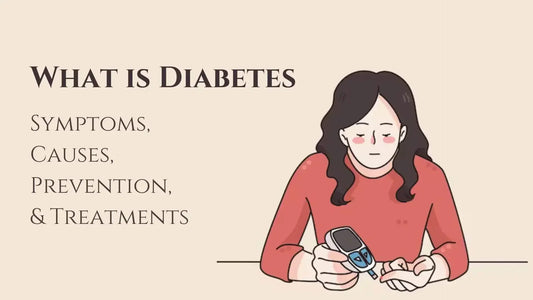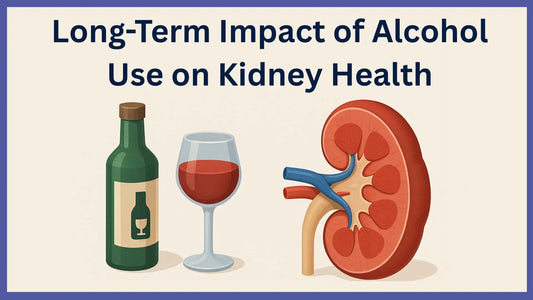
What is Diabetes: Types, Symptoms, Causes & Natural Ayurvedic Treatment
Diabetes is one of the most common diseases in the world, as it affects a large number of people in the whole world.
It is a metabolic disorder that causes high blood sugar. Though there are several types of diabetes, type 2 is the most common and typical one.
In this article, we will learn about diabetes, its symptoms, causes, and the possible treatment of this medical condition.
What is Diabetes?
Diabetes occurs when the body’s blood glucose or sugar is higher than normal. In our bodies, we have a hormone called insulin, which is produced by the pancreas and helps glucose enter our cells for energy.
The condition of diabetes hinders the body's production of insulin or prevents it from using insulin adequately. When that happens, glucose (blood sugar) stays in the blood and never reaches the cells.
Major Types of Diabetes
Diabetes has different types, which include type 1 diabetes, type 2 diabetes (the most common type of diabetes), and gestational diabetes.
1. What is type 1 diabetes?
Individuals dealing with type 1 diabetes will make little or no insulin hormone whatsoever, as their immune system obliterates the insulin-producing cells in the pancreas.
Though type 1 diabetes is not restricted to any particular age group, children or young adults are the most prone to deal with this disease.
People who are diagnosed with type 1 diabetes need to take insulin now and then to make their bodies function properly.
2. What is type 2 diabetes?
In type 2 diabetes, body cells find it hard to regulate insulin properly. The pancreas might make insulin, but not enough to keep the blood glucose levels intact.
As mentioned before, type 2 diabetes is the most common type of diabetes, and it is most common in people who are overweight, obese, and have a family history.
Type 2 diabetes can be prevented if one takes precautionary measures like focusing on health and preventing weight gain.
3. Gestational Diabetes
Gestational diabetes is quite uncommon and occurs during pregnancy. Often, this type of diabetes is cured automatically right after the baby is born.
However, gestational diabetics have a slight chance of developing type 2 diabetes later in life.
4. Prediabetes
Prediabetics have blood sugar levels higher than normal people; however, they are not high enough to cause type 2 diabetes.
If prediabetic patients grow reckless towards their health, they might be diagnosed with type 2 diabetes in the future.
Furthermore, prediabetic patients also have higher heart risk factors than people with normal glucose levels.
What are the Symptoms of Diabetes?
The following are the primary symptoms of diabetes. If your body shows any of these symptoms, immediately rush to your doctor and get your blood sugar levels checked.
-
Urinating (peeing) a lot, usually at night
-
Increased thirst (polydipsia) or dry mouth
-
Weight loss without trying
-
Increased hunger
-
Experiencing blurry vision
-
Experiencing numbness or tingling in the hands or feet
-
Feeling very tired
-
Dealing with dry skin
-
Having sores and wounds that heal slowly
-
Diagnosed with more infections than usual
What Causes Diabetes?
Irrespective of the type, supernumerary glucose circulating in the bloodstream stems from diabetes, which is the main cause too. However, the type of diabetes still matters, as causes are associated with the type of diabetes one has.
Causes of Type 1 Diabetes
The primary cause behind type 1 diabetes is still vague; however, some scientists believe that when the immune system attacks or destroys insulin-producing beta cells in the pancreas, it causes type 1 diabetes.
In medical terms, this phenomenon is referred to as an autoimmune disease. Some studies also find it possible that family genes set off the immune system to attack insulin-producing beta cells in the pancreas.
Causes of Type 2 Diabetes
The insulin resistance can lead to type 2 diabetes. This phenomenon occurs when the cells in one’s muscles, fat, or liver stop responding to insulin hormones.
Many causes can trigger insulin resistance, hence causing type 2 diabetes:
-
Lack of physical activities
-
Unhealthy diet
-
Genetics
Causes of Gestational Diabetes
Gestational diabetes mainly occurs during pregnancy, and many scientists believe that changes in hormones are the main cause of gestational diabetes.
While a woman is pregnant, the placenta in her body generates hormones that make cells less sensitive to insulin. This whole phenomenon can cause high blood sugar, hence causing gestational diabetes.
Women who ultimately gain lots of pounds during pregnancy or become overweight are likely to be diagnosed with gestational diabetes.
Can Diabetes be Cured?
Diabetes is an incurable disease; however, it is still manageable with some tweaks in lifestyle, like:
-
Avoiding junk and unhealthy foods
-
Testing blood sugar levels regularly
-
Avoiding allopathic medicines
-
Accepting an Ayurvedic solution
-
Indulging in physical activities.
Allopathic medicines are not the most effective way to manage diabetes; thus, one should rely on an ayurvedic cure that is both best and sustainable.
Ayurvedic medicines like those of Dr. Madhu Amrit represent the divine purity of Ayurveda, and no other medicine can hold a candle to it.
How to Prevent Diabetes?
Though diabetes is not curable, one can still take some steps to prevent it. One of those steps is lifestyle changes.
The transition from an unhealthy lifestyle to a healthy one is the best approach for someone who wants to prevent diabetes.
You can adopt some best ways to prevent diabetes with ayurveda. Lifestyle changes like losing weight, having healthy food like green veggies, or healthy fats, or being more physically active, etc.
How to Control Diabetes?
If you have been diagnosed with diabetes, then controlling it is the best option you have. Following are some belittle steps you can take to control your diabetes.
-
Eat good carbs
-
Decrease the amount of salt in your diet.
-
Eat more vegetables and fruits for diabetes.
-
Say no to added sugars.
-
Decrease your alcohol intake.
-
Involve in some physical workout.
-
Take help of ayurvedic herbs.
-
Try Keeda Jadi
What are the Treatments for Diabetes?
Treatments for diabetes, like insulin pumps, islet cell transplants, medication, etc., are available in the new era of medical science; however, they are not effective at all.
Allopathic treatments are only known to provide temporary relief, which means one has to keep going with the treatment again and again to feel better.
The sustainable approach for diabetes treatment is Ayurveda, as this medical practice is 5000 years old and has no side effects at all. Regardless of any disease, it is highly suggested that everyone choose Ayurveda treatment over anything else.
Conclusion
In a nutshell, diabetes is a disease that can cause serious physical damage to the body, so managing it is a wise choice.
Diabetes has multiple types, such as prediabetes, type 1 diabetes, type 2 diabetes, and gestational diabetes. All of the types have different effects on one’s body, and the causes are also different.
Though a cure for diabetes is not available in medical science, there are still various ways one can manage or prevent it. The management of diabetes reclines with the ideology of bringing some tweaks to the lifestyle and replacing a healthy lifestyle with a junkie lifestyle.
References
- Roglic, G. (2016). WHO Global report on diabetes: A summary. International Journal of Noncommunicable Diseases, 1(1), 3–8. Retrieved from: https://doi.org/10.4103/2468-8827.184853
- Ramachandran, A. (2014). Know the signs and symptoms of diabetes. Indian Journal of Medical Research, 140(5), 579–581.
- Clark, N., Fox, K., & Grandy, S. (2007). Symptoms of diabetes and their association with the risk and presence of diabetes: Findings from the Study to Help Improve Early Evaluation and Management of Risk Factors Leading to Diabetes (SHIELD). Diabetes Care, 30, 2868–2873. Retrieved from: https://doi.org/10.2337/dc07-0816
- Unraveling the Causes of Diabetes. (n.d.). Retrieved from: https://www.chem.uwec.edu/Chem454_S09/causesofdiabetes.pdf

Dr. Pooja Verma
Dr. Pooja Verma is a sincere General Ayurvedic Physician who holds a BAMS degree with an interest in healing people holistically. She makes tailor-made treatment plans for a patient based on the blend of Ayurveda and modern science. She specializes in the treatment of diabetes, joint pains, arthritis, piles, and age-related mobility issues.



